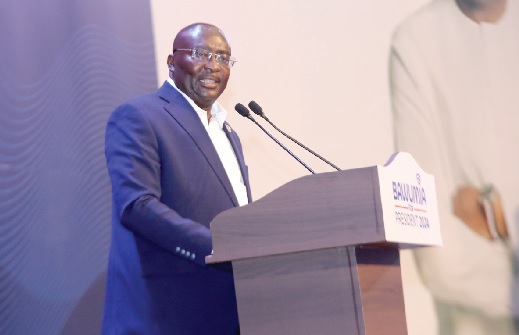In Part I, I argued the speech - a) struck the right partisan tone; b) acknowledged the economic pinch points Ghanaians have felt; c) did not adequately reconcile the force of the many arguments and assertions made in 2016 with eventual economic realities; and d) was not very measured in the number of campaign promises.
In Part II, I argued that a) there is a need to share in the successes and challenges faced by the current administration, given his role as Vice-President; and b) announcing different fiscal policies is not an act of distancing from the President.
I also expressed concerns about the seeming rewriting of the narrative about the Economic Management team post-2016 elections.
In Part III, I turn to the fiscal policy regime and some of the ideas Dr Bawumia shared. There were ideas shared in other policy domains, but I focus on fiscal policy because of our two most recent International Monetary Fund (IMF) bailouts.
Highlights of the Vice-President’s ideas
First is taxation. Dr Bawumia’s ideas can be placed into three categories – a) tax repeals; b) tax incentives; and c) changes to the tax regime. The most notable of the tax repeals is the E-Levy.
The promised repeal is tied to his vision of a cashless economy and encouraging the use of electronic payments. A tax like the E-Levy only serves as a disincentive.
There are two issues the Vice-President will have to contend with as the campaign progresses – a) the politics of the E-Levy because it is an imposition of the current government and b) the expected revenue loss and how his administration will address the loss.
The use of tax incentives to encourage the private sector to partner government in key areas like tourism, creative arts, construction, etc. is important. It, however, depends on how attractive the incentives are.
Unlike governments whose motive is to provide social and economic goods; the private sector’s motive is return on investment.
The government, therefore must offer incentives that motivate them beyond a desire to partner with the government.
The proposal to move to a flat tax system is a major paradigm shift in the current configuration of our tax regime.
The Vice-President is correct that a flat tax system simplifies the tax code and makes it easier for citizens to meet their tax obligations.
I do not need to offer economics advice to the Vice-President. But a flat tax regime can potentially be regressive.
The net and material effect will be different for high-income earners compared to low-income earners.
Second, fiscal discipline. Dr Bawumia promised this - “My government will enhance fiscal discipline through an independent fiscal responsibility council enshrined in the Fiscal
Responsibility Act, 2018 (Act 982).” Fiscal discipline was a major campaign issue for the NPP in 2016.
In their 2016 manifesto, the idea of a fiscal council was promised. Fiscal discipline is important. Anyone who pays close attention to the Auditor General’s report, for example, will note that the infractions remain the same.
What continues to change is the monetary value of those infractions. How to ensure it has been the challenge and whether an independent fiscal responsibility council is the answer remains to be seen.
On the question of government spending. All governments must spend in two categories — mandatory (debt repayment, salaries, wages, etc.) and discretionary (programmes that governments enact because they consider them a priority such as Free SHS).
Dr Bawumia proposed some ideas such as incentivising the private sector to take up construction or leasing government vehicles instead of outright purchase as some of the ways to keep government spending in check and the deficit within appropriate targets.
A look at our budget structure, though, shows that the burden is not necessarily from discretionary spending but from mandatory spending.
So, as we seek to control discretionary spending, governments cannot overlook the reality of mandatory spending.
On the question of debt. The speech was largely silent on how a Bawumia administration plans to deal with the cyclical problem of government debt. Ghana, as well as countries that regularly benefit from debt relief, tend to fall into this vicious cycle of debt accumulation — debt relief — temporary restrain — debt accumulation.
A look at the debt trajectories of countries that benefited from the HIPC Initiative will substantiate this point.
I recognise the Vice-President in his Housing for All Policy, for example, stated “We will partner with the private sector to build large housing estates without the government having to borrow or spend.”
But as the campaign progresses, the vice president needs to articulate a bolder approach that will demonstrate how we end this vicious cycle.
I will conclude next week with a focus on the important issue of good governance.
The writer is a Democracy and Development fellow at the Ghana Centre for Democratic Development (CDD-Ghana)

